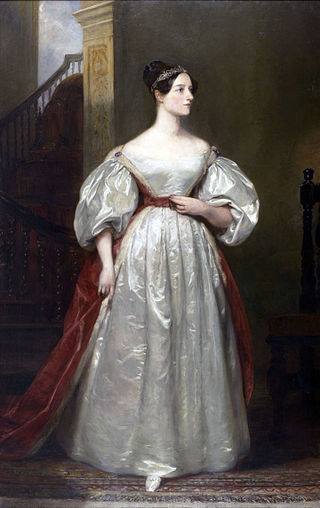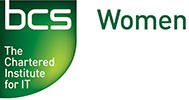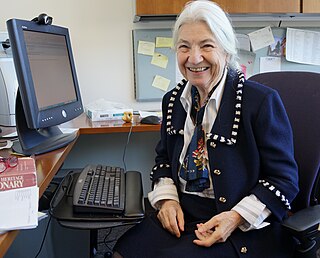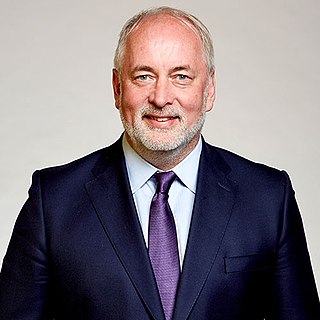Related Research Articles

The British Computer Society (BCS), branded BCS, The Chartered Institute for IT, since 2009, is a professional body and a learned society that represents those working in information technology (IT) and computer science, both in the United Kingdom and internationally. Founded in 1957, BCS has played an important role in educating and nurturing IT professionals, computer scientists, computer engineers, upholding the profession, accrediting chartered IT professional status, and creating a global community active in promoting and furthering the field and practice of computing.

Anne Jemima Clough was an early English suffragist and a promoter of higher education for women. She was the first principal of Newnham College.

Women in computing were among the first programmers in the early 20th century, and contributed substantially to the industry. As technology and practices altered, the role of women as programmers has changed, and the recorded history of the field has downplayed their achievements.
Amanda Elizabeth Chessell is a computer scientist and a Distinguished Engineer at IBM. She has been awarded the title of IBM Master Inventor. She is also a Member of the IBM Academy of Technology.

Dame Wendy Hall is a British computer scientist. She is Regius Professor of Computer Science at the University of Southampton.

BCSWomen is a Specialist Group of the British Computer Society, The Chartered Institute for IT, that provides networking opportunities for all BCS professional women working in IT around the world, as well as mentoring and encouraging girls and women to enter or return to IT as a career. Founded by Dr Sue Black, as of March 2020 the Chair of BCSWomen is Andrea Palmer. BCSWomen has the aim of supporting women working in and considering a career in Information Technology.

Jane Elizabeth Hillston is British professor of Quantitative Modelling and Head of School in the School of Informatics, University of Edinburgh, Scotland.

Ruzena Bajcsy is an American engineer and computer scientist who specializes in robotics. She is professor of electrical engineering and computer science at the University of California, Berkeley, where she is also director emerita of CITRIS.
Informatics is the study of computational systems. According to the ACM Europe Council and Informatics Europe, informatics is synonymous with computer science and computing as a profession, in which the central notion is transformation of information. In other countries, the term "informatics" is used with a different meaning in the context of library science, in which case it is synonymous with data storage and retrieval.

Professor Martin C. Henson FBCS FRSA is an English computer scientist based at the University of Essex. He is dean for international affairs and is affiliated to the School of Computer Science & Electronic Engineering. Henson was head of the department of computer science from 2000 to 2006.
Cornelia Boldyreff is very active in encouraging girls into computing, is a Council Member of The BCS, The Chartered Institute of IT, a Committee member of the BCSWomen and a visiting professor in the School of Computing and Mathematical Sciences at the University of Greenwich in London.

Margaret Ross MBE, FBCS is an Emeritus Professor of Software Quality at Southampton Solent University. She serves on the BCSWomen Committee of the British Computer Society.

Liz Bacon is Principal and Vice-Chancellor of Abertay University, Dundee.

Nicholas Robert Jennings is a British computer scientist and the current Vice-Chancellor and President of Loughborough University. He was previously the Vice-Provost for Research and Enterprise at Imperial College London, the UK's first Regius Professor of Computer Science, and the inaugural Chief Scientific Adviser to the UK Government on National Security. His research covers the areas of AI, autonomous systems, agent-based computing and cybersecurity. He is involved in a number of startups including Aerogility, Contact Engine, Crossword Cyber Security, and Reliance Cyber Science. He is also an adviser to Darktrace, a member of the UK Government's AI Council, chair of the National Engineering Policy Centre and a council member for the Engineering and Physical Sciences Research Council.

Gillian Arnold is a British Information technology leader. She is a BCS Vice President and the Past Chair of the BCSWomen Specialist Group that supports women in the IT industry. In 2015, she was identified as the 9th Most Influential Women in UK IT 2015, by Computer Weekly. In 2016, Arnold was again identified as one of the 50 most influential women in UK IT 2016 by Computer Weekly.
Janet Abbate is an associate professor of science, technology, and society at Virginia Tech. Her research focuses on the history of computer science and the Internet, particularly on the participation of women in the field.
Mary Clare Coombs was a British computer programmer and schoolteacher. Employed in 1952 as the first female programmer to work on the LEO computers, she is recognised as the first female commercial programmer. The National Museum of Computing documents her contribution.

Gender disparity in computing concerns the disparity between the number of men in the field of computing in relation to the lack of women in the field. Originally, computing was seen as a female occupation. As the field evolved, so too did the demographics, and the gender gap shifted from female dominated to male dominated. The believed need for more diversity and an equal gender gap has led to public policy debates regarding gender equality. Many organizations have sought to create initiatives to bring more women into the field of computing.
Susan Bond, was a scientific officer and computer programmer for the Mathematics Division of the Royal Radar Establishment (RRE) in the United Kingdom. She worked extensively on the programming language ALGOL 68 and the Royal Radar Establishment Automatic Computer (RREAC), an early solid-state electronics, ICL 1907F computer.
Gillian Rachael Hayes is an American computer scientist. She is the Robert A. and Barbara L. Kleist Professor in the Donald Bren School of Information and Computer Sciences and Vice Provost for Graduate Education and Dean of the Graduate Division at UC Irvine.
References
- 1 2 Newnham College Register, 1990, p144
- 1 2 3 Gillian Lovegrove: Interview, Conducted by Janet Abbate for the IEEE History Center, 20 September 2001
- ↑ Southampton University biography
- 1 2 3 Janet Abbate (2012). Recoding Gender: Women's Changing Participation in Computing. MIT. pp. 153–155.
- ↑ Lovegrove, Gillian, Segal, Barbara (Eds.),Women into Computing: Selected Papers 1988–1990, Springer 1991
- ↑ .G. Lovegrove, M. Fletcher, C. Johnson and C. Mayer: Staffordshire IT EQUATE: Project and Plans. IFIP Conference on Women, Work and Computerization, Manchester 1994
- ↑ Colin Myers, Professional Awareness in Software Engineering, McGraw-Hill 1995
- ↑ Rupert Simpson, 'Choices and the feel-right factor: Computer Books', The Times Higher Education Supplement, 8 Sep 1995
- ↑ Goodwin, 'IT groups demand skills top party manifestos', Computer Weekly, Jan 2001
- ↑ 'Recruiting the New IT Girls', BBC, 23 Jan 2002
- ↑ "IT Professionals in Education:Increasing the Supply, 2005" (PDF). Archived from the original (PDF) on 24 September 2016. Retrieved 14 September 2016.
- ↑ Claire Sanders, 'A Woman's Place Is In The Laboratory', The Times Higher Education Supplement, 12 Oct 2001, p7
- ↑ Caroline Davis, Skills Shortage Hits IT Industry, The Times Higher Education Supplement, 15 Feb 2002, p3